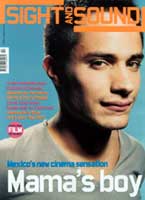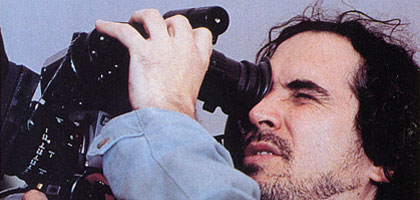
Interview

Editor's note: A production error resulted in three lines being omitted from the following interview in the April issue of Sight and Sound.
Edward Lawrenson: You've said the idea behind 'And Your Mother Too' had been knocking around for ten years. Why did you make it now?
Alfonso Cuarón: It was a combination of several things. My son is now a teenager so I had to watch all those American teen comedies. Films like American Pie are so hypocritical and moralistic - they have fun at their characters' expense and ridicule them. I was also searching for a new style. I felt I was becoming claustrophobic. My last two films were very subjective - you saw everything filtered through the perception of the main characters. I wanted to do something with a sense of objective distance, so we came up with the idea of the narrator. The story started to make sense when we decided that context would be as important as character. The narrator supplies context - often he talks about things that have nothing to do with the characters.
The narration has a melancholic drift - the voiceover draws our attention to things like fatal accidents.
You can't really enjoy life until you have a full awareness of death. We tend to have an awareness of death only when something critical happens, like the passing on of a loved one. We should have an awareness of death every day.
That's not something most adolescents know about.
That's part of the problem. The film is about identity: two teenagers who are seeking their identity as adults, Luisa who is seeking an identity as a liberated woman and a country that is a teenage country trying to find its identity as a grown-up nation. Finding your identity is a lifelong, ongoing process, and the more you are aware of death, the more your identity evolves. Julio and Tenoch are completely unaware of death - they feel they control life.
Did you draw on your own memories for the portrait of adolescence?
There was a lot of that, and a lot of memories supplied by my brother Carlos, who co-wrote the screenplay. The nanny in the film was similar to my nanny in real life. And some of the events - the scene where the pigs destroy the tent at the beach - happened to my director of photography. But the movie is only autobiographical in an emotional sense.
The film is very sympathetic to the underclass - for instance the
way the camera follows the café workers into the kitchen
when the three main characters are having a meal so we get a glimpse
of their lives too.
There are many different Mexicos that exist at the same time and sometimes in the same space, though they don't really co-exist. The barriers between the classes are a big problem, though everyone tries to deny it.
Attention to class issues is something the film shares with 'Great Expectations'. Could you have explored this so fully in Hollywood?
Definitely not. When I was developing the script for Great Expectations the producers were worried about my depiction of class relations. It's because Americans insist there's no class problem in the US.
What were the main differences between making this film and 'Great Expectations'?
This movie cost me three times less. I worked pretty much with the same creative collaborators - what changed was the size of the crew. In Hollywood every crew member's job is specialised - you have a guy who's in charge of placing an ashtray, and he's the best in the business - but here there was a degree of improvisation. And the other big difference here was that I was also the producer, which left me free to make every decision.
In the opening scene there's a poster of the Hal Ashby film 'Harold and Maude'. Was that an influence?
To be honest with you, I requested a different poster, but it didn't arrive. The poster I wanted was for Godard's Masculin féminin.
There's a touch of Truffaut's 'Jules et Jim' about the film too.
That was unconscious because Jules et Jim is a film I hadn't seen for years. But I watched it recently and I recognise similarities such as the love-triangle story. The use of the voiceover was inspired more by Godard's Bande à part and Masculin féminin. And in terms of tone and spirit I also referred to Jacques Rozier's Adieu Philippine.
The film has surprisingly explicit sex scenes for a teen comedy.
When you're a teenager, sex is the only thing you have in your head. That's what I find so hypocritical about US movies. Another thing I dislike is that in most of them getting laid is like an image of Disneyland, all magic and happiness. The sex in my film is very clumsy, very rapid - we were trying to create a moment of honesty. We approached the sex in just the same way as we did the scene in the supermarket.
